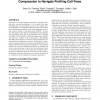Free Online Productivity Tools
i2Speak
i2Symbol
i2OCR
iTex2Img
iWeb2Print
iWeb2Shot
i2Type
iPdf2Split
iPdf2Merge
i2Bopomofo
i2Arabic
i2Style
i2Image
i2PDF
iLatex2Rtf
Sci2ools
139
click to vote
SOFTVIS
2010
ACM
2010
ACM
Towards anomaly comprehension: using structural compression to navigate profiling call-trees
Developers must often diagnose anomalies in programs they only have a partial knowledge of. As a result, they must simultaneously reverse engineer parts of the system they are unfamiliar with while interpreting dynamic observation data (performance profiling traces, error-propagation channels, memory leaks), a task particularly difficult. To support developers in this kind of comprehension task, filtering and aggregation have long been suggested as key enabling strategies. Unfortunately, traditional approaches typically only provide a uniform level of aggregation, thus limiting the ability of developers to construct context-dependent representations of a program's execution. In this paper, we propose a localised approach to navigate and analyse the CPU usage of little-known programs and libraries. Our method exploits the structural information present in profiling call selectively raise or lower the local abstraction level of the performance data. We explain the formalism underpi...
Dynamic Observation Data | Performance Profiling | Performance Profiling Traces | SOFTVIS 2010 | Visualization |
| Added | 06 Dec 2010 |
| Updated | 06 Dec 2010 |
| Type | Conference |
| Year | 2010 |
| Where | SOFTVIS |
| Authors | Shen Lin 0003, François Taïani, Thomas C. Ormerod, Linden J. Ball |
Comments (0)

